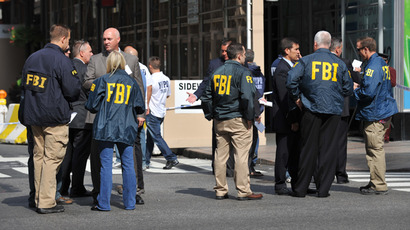Obama warns making secret court's ruling public could mean 'grave danger'

In a bid to avoid revealing the details of a secret ruling on domestic surveillance, the White House has warned a federal judge that making the decision public could do “exceptionally grave and serious damage to the national security” of the country.
The grim advice comes after the Electronic Frontier Foundation
(EFF) sued the US Department of Justice for details of a Foreign
Intelligence Surveillance Court ruling that determined that the
federal government violated the 2008 FISA Amendment Act.
The FISA Amendment, which was the expansion of a pre-existing
law under the George W. Bush administration, made it legal for the
government to conduct widespread foreign and domestic email and
phone surveillance without probable cause. Included is the
provision that the National Security Administration (NSA) may
monitor any citizen suspected of conversing with someone outside
the United States.
The Obama White House extended the provision for another five
years in December of 2012.
Using the Freedom of Information Act, the EFF hoped to force the
government into making public the details of the court’s secret
ruling.
Foreign Intelligence Surveillance Court proceedings and the
records kept of the hearings are kept off limits from the public
because the court rules on warrant requests for suspected foreign
intelligence agents operating inside the US. Only federal
government officials are on hand and, unlike a public or civil
trial, a prosecutor doesn't face off against a defense. Instead,
evidence is shown and a ruling follows.
The EFF’s initial request was denied because releasing the court
transcript would, the government said, “implicate classified
intelligence sources and methods.” Senator Ron Wyden
(D-Oregon), who is known for his outspoken criticism of domestic
surveillance, was briefed on the court’s opinion and authorized to
reveal that the federal government’s actions “circumvented the
spirit of the law” and was “unreasonable under the Fourth
Amendment,” as quoted by Wired Magazine.
Wyden has been a vocal opponent of the expansion of the FISA
Amendment, which has also been criticized by the ACLU. He was one
of the few Senators to vote against continuing President Bush’s
expansions in 2012, comparing the vague language and broad
enforcement allowances to the method British soldiers used to make
their way through colonists’ homes before the American
Revolution.
“It is never okay, never okay for government officials to use
a general warrant to deliberately invade the privacy of a
law-abiding American,” he told reporters in December 2012
“It wasn’t okay for constables and customs officials do it in
colonial days, and it’s not okay for the National Security Agency
to do it today.”
In 2008 then-Senator Obama initially opposed the FISA expansion
before eventually voting in step with President Bush, saying the
new provisions were necessary to fight terrorism.
In February of this year the Supreme Court declined to hear a
civilian challenge to the law.














